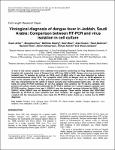Virological diagnosis of dengue fever in Jeddah, Saudi Arabia: Comparison between RT-PCR and virus isolation in cell culture
Azhar, Esam
Kao, Moujahed
Niedrig, Matthias
Masri, Badr
Godus, Azad
Badierah, Raed
Khan, Nassem
Almazrooa, Adnan
Ashshi, Ahmad
Jamjoom, Ghazi
A total of 233 serum samples were collected from patients presenting to King Abdulaziz University Hospital with suspected cases of Dengue Fever (DF) from 2006 to 2008. Dengue virus was successfully isolated from 70 samples by culture on C6/36 and LLC-MK2 cells; it was then detected by indirect immunofluorescence assay (IFA). The cytopathic effect (CPE) of dengue virus on C6/36 appeared in most of the samples within 1-4 days post-inoculation comparing to 7-12 days on LLC-MK2 cells, and this was characterized by the ability to induce syncytia and multinucleated giant cells. On the other hand, by using RT-PCR technique, 87 (37.3%) samples were positive. All 70 (30.4%) samples with positive cell culture results were detectable by RT-PCR in addition to 17 culture-negative samples were RT-PCR positive. Dengue virus type 1 (DENV-1) was the dominant serotype followed by DENV- 3 and DENV-2, while DENV-4 was not detected in tested samples. These results indicate that DENV-RNA detection by RT-PCR is more sensitive than virus isolation. We suggest that the high sensitivity coupled with the turnaround time, have made the RT-PCR a better choice as a routine test for DENV diagnosis.
Dateien zu dieser Publikation
Keine Lizenzangabe

